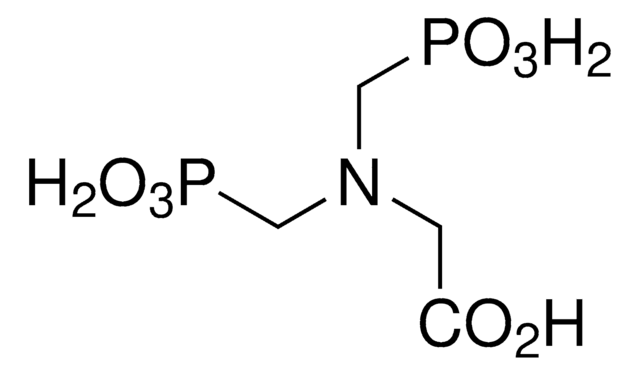337757
N-(Phosphonomethyl)glycine
96%, for peptide synthesis
Sinónimos:
Glyphosate
About This Item
Productos recomendados
product name
N-(Phosphonomethyl)glycine, 96%
assay
96%
form
powder
reaction suitability
reaction type: solution phase peptide synthesis
mp
230 °C (dec.) (lit.)
application(s)
peptide synthesis
SMILES string
OC(=O)CNCP(O)(O)=O
InChI
1S/C3H8NO5P/c5-3(6)1-4-2-10(7,8)9/h4H,1-2H2,(H,5,6)(H2,7,8,9)
InChI key
XDDAORKBJWWYJS-UHFFFAOYSA-N
¿Está buscando productos similares? Visita Guía de comparación de productos
General description
Application
- Water Pollution Analysis: Campanale et al. assessed glyphosate and AMPA pesticides in river waters and sediments, providing crucial data on the environmental distribution and persistence of N-(Phosphonomethyl)glycine derivatives. This research supports efforts to monitor and regulate environmental pollutants effectively (Campanale et al., 2024).
- Public Health Studies: Urinary biomonitoring of glyphosate exposure was conducted among farmers, utilizing N-(Phosphonomethyl)glycine as a marker. This study contributes to our understanding of occupational exposure risks and supports the development of health safety guidelines (Chang et al., 2024).
signalword
Danger
hcodes
Hazard Classifications
Acute Tox. 4 Dermal - Aquatic Chronic 2 - Eye Dam. 1
Storage Class
11 - Combustible Solids
wgk_germany
WGK 2
flash_point_f
Not applicable
flash_point_c
Not applicable
ppe
dust mask type N95 (US), Eyeshields, Gloves
Certificados de análisis (COA)
Busque Certificados de análisis (COA) introduciendo el número de lote del producto. Los números de lote se encuentran en la etiqueta del producto después de las palabras «Lot» o «Batch»
¿Ya tiene este producto?
Encuentre la documentación para los productos que ha comprado recientemente en la Biblioteca de documentos.
Los clientes también vieron
Protocolos
EPA Method 547 outlines the analysis of glyphosate in drinking water by direct aqueous injection HPLC, post column derivatization, and fluorescence detection
Protocol for LC/MS Analysis of Glyphosate and Metabolites on apHera™ NH2, 2 mm I.D. Column
Nuestro equipo de científicos tiene experiencia en todas las áreas de investigación: Ciencias de la vida, Ciencia de los materiales, Síntesis química, Cromatografía, Analítica y muchas otras.
Póngase en contacto con el Servicio técnico













